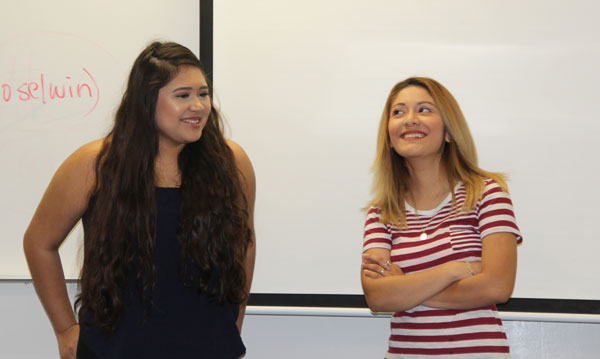Fewer slammed doors the goal of Interpersonal Communications class

Words fly. Tempers flare. Voices shout - “But Criminal Minds is better than Shark Week!”
In Interpersonal Communications, students role-play common conflicts and how to tackle them, whether roommates determining which TV show to watch, couples deciding whose family to visit or employees deciding whose idea is best.
“You learn how to communicate, not just socially but professionally,” said student Adam Alvarado, of Texas City. “In the electronic age, interpersonal communication to me is a lost art. This is learning new ways to do things. You learn how to talk to people.”
Today they dive into the five styles of conflict resolution – competing, collaborating, compromising, avoiding and accommodating. The goal is collaboration, where all parties win, not just one (or neither).
The homework is applicable to nearly any situation from roommate drama to family crises.
“It’s eye-opening. I am now a stepmom to a 12-year-old, and I’ve never been a mom,” said student Danielle Kirkpatrick, of Webster. “It’s taught me how people listen and what they listen for. I have to put myself in her shoes. I have to learn how to speak to her with tact. It gives me some strategies. It has helped me see other perspectives.”
Professor Julie Garcia, who has taught at COM five years and previously taught at Texas State Technical College in Harlington, guides students in analyzing real-world situations.
“I also use a lot of films. I have them pick a movie from the list and identify six to eight concepts we’ve talked about in class like the self-fulfilling prophecy,” said Garcia.
Other assignments include people-watching in crowds.
“Students have to note nonverbal communication and gender and cultural and generational differences,” said Garcia.
It’s an exercise in viewing life from another’s eyes.
“Their whole goal is to see outside themselves and to see others’ perspectives,” said Garcia.
The class also supports the college’s quality enhancement plan: oral communication across the curriculum, which seeks to help students improve their public speaking skills, a quality valued by employers.
It’s paying off for students as they apply what they discover to situations outside the classroom.
“You learn life skills. I’m learning why I am the way I am,” said Alvarado. “I think we all have stupid patterns, but if we take classes like this, we can break them.”
For more information, email jgarcia37@com.edu.
